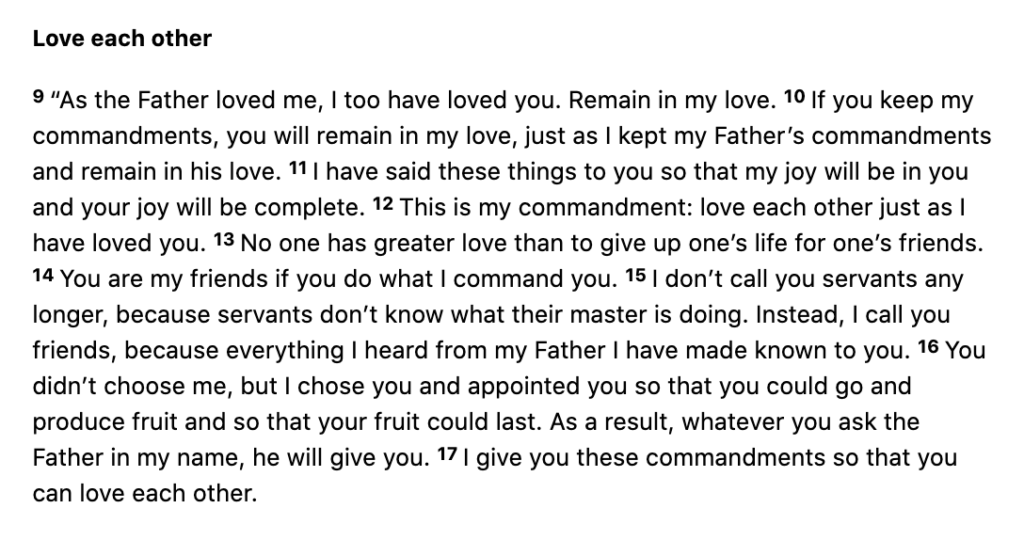John 15:9-17

In John 15, Jesus shares the above statement with his disciples. It is both encouraging, and perplexing to me. Encouraging because we hear of the love that Jesus has for us and because Jesus gives instructions on how to display the love we have received for others (through following the commands of God). Perplexing because, as Jesus often does, he calls us to a high standard and a high level of love (to give our lives for our friends as Jesus will do in just a few short chapters).
So, what are we to do with such a statement, with such a command?
Well, first, we learn and understand the nature of how love flows from the Father to the Son and on to us. Later in the book we know as 1 John, we will read that love does indeed originate within God’s own self and from that love we receive, we are now able to share love with others. Love flows from God to humanity. It does not originate within us, but the very act of participating in love is an act of participating in God’s own self. We experience the divine in actions of love. Or, perhaps to use Jesus’ language, the kingdom of God comes on earth as it is in heaven when we love.
Not only that, but our participating in love leads to joy–completeness, fulfillment, peace. Our love leads to shalom. It brings the creation back into the goodness that God created it to bear witness to. It pushes the sinfulness and selfishness within us out so that the wholeness of God’s love can take root in our lives. It has been remarked that the Fruit of the Spirit (listed by Paul in Galatians 5) begins with love. After love, all the other items listed can become descriptions of what that love truly means and what it looks like in action: joy, peace, patience, kindness, goodness, faithfulness, gentleness, and self-control. Love leads to these other virtues, and these virtues describe love.
Third, I think we must not shy away from the perplexing piece of this passage. Jesus is clear throughout his ministry that to live in such a way will lead to hardship and death. He knows that his life is leading to the cross. And not just that, but he invites his followers to choose this path too. Not because it will be easy and not because it will put us on a fast-track to success and long-life. Jesus invites us to give up our lives for our friends because to do that is to mirror the very same love that God has for the creation. To give up our lives is costly, but by doing so we bear the image of God that we were created with, and the world is better for it. The world will glimpse the reality of heaven coming on earth, and will see the truth of the way of love over against the ways of this world of power, dominance, coercion, and force. To follow Jesus, to participate in the divine love is to imitate the life of Jesus who bears witness to the love of God most clearly in his rejection of the ways of the world and instead choosing love–even to the point of death.
And last (although there is much more that could be drawn from this passage that we will leave for another day), Jesus invites us to remain in his love. To remain in his love, or to abide in it. To make our home within the love of God. To make your home in the love of God is to be at ease within it. It is the place that we return to every day. It is the place where we rest and recuperate, and where we strike out from every day. (During these past several months, it is the place that we never leave, which while it has been difficult for some, is also quite helpful for the point I am trying to make.) To abide in the love of God is to live in it. It is from this place of love that all else that we do and that we are flows from. We draw from the love of Jesus in our relationships. We utilize it when we hear the news. When we log on to social media, we pull from the well of God’s love instead of from someone’s post or differing perspective. When we encounter our enemies, we turn to the love of Jesus. To remain in God’s love, to abide in it, is to always begin there. We never leave the love of God, but instead it is always our first response, our first action, our first way forward.
And so, this week, I invite you to learn to remain in the love of Jesus. Learn to live in the love of God. For it is from this deep well of love that we must learn to draw from for each and every encounter that we have. Jesus commands us to follow his way–the way of love. May we cultivate a life of love. May we turn from the paths of anger, frustration, anguish, pain, domination, coercion, force, selfishness, and sinfulness, and may we learn to live in God’s love.

